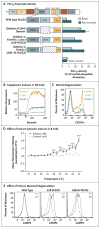Cold urticaria, immunodeficiency, and autoimmunity related to PLCG2 deletions
- PMID: 22236196
- PMCID: PMC3298368
- DOI: 10.1056/NEJMoa1102140
Cold urticaria, immunodeficiency, and autoimmunity related to PLCG2 deletions
Abstract
Background: Mendelian analysis of disorders of immune regulation can provide insight into molecular pathways associated with host defense and immune tolerance.
Methods: We identified three families with a dominantly inherited complex of cold-induced urticaria, antibody deficiency, and susceptibility to infection and autoimmunity. Immunophenotyping methods included flow cytometry, analysis of serum immunoglobulins and autoantibodies, lymphocyte stimulation, and enzymatic assays. Genetic studies included linkage analysis, targeted Sanger sequencing, and next-generation whole-genome sequencing.
Results: Cold urticaria occurred in all affected subjects. Other, variable manifestations included atopy, granulomatous rash, autoimmune thyroiditis, the presence of antinuclear antibodies, sinopulmonary infections, and common variable immunodeficiency. Levels of serum IgM and IgA and circulating natural killer cells and class-switched memory B cells were reduced. Linkage analysis showed a 7-Mb candidate interval on chromosome 16q in one family, overlapping by 3.5 Mb a disease-associated haplotype in a smaller family. This interval includes PLCG2, encoding phospholipase Cγ(2) (PLCγ(2)), a signaling molecule expressed in B cells, natural killer cells, and mast cells. Sequencing of complementary DNA revealed heterozygous transcripts lacking exon 19 in two families and lacking exons 20 through 22 in a third family. Genomic sequencing identified three distinct in-frame deletions that cosegregated with disease. These deletions, located within a region encoding an autoinhibitory domain, result in protein products with constitutive phospholipase activity. PLCG2-expressing cells had diminished cellular signaling at 37°C but enhanced signaling at subphysiologic temperatures.
Conclusions: Genomic deletions in PLCG2 cause gain of PLCγ(2) function, leading to signaling abnormalities in multiple leukocyte subsets and a phenotype encompassing both excessive and deficient immune function. (Funded by the National Institutes of Health Intramural Research Programs and others.).
Figures



Similar articles
-
PLCG2-associated immune dysregulation (PLAID) comprises broad and distinct clinical presentations related to functional classes of genetic variants.J Allergy Clin Immunol. 2024 Jan;153(1):230-242. doi: 10.1016/j.jaci.2023.08.036. Epub 2023 Sep 26. J Allergy Clin Immunol. 2024. PMID: 37769878
-
A hypermorphic missense mutation in PLCG2, encoding phospholipase Cγ2, causes a dominantly inherited autoinflammatory disease with immunodeficiency.Am J Hum Genet. 2012 Oct 5;91(4):713-20. doi: 10.1016/j.ajhg.2012.08.006. Epub 2012 Sep 20. Am J Hum Genet. 2012. PMID: 23000145 Free PMC article.
-
Novel PLCG2 Mutation in a Patient With APLAID and Cutis Laxa.Front Immunol. 2018 Dec 14;9:2863. doi: 10.3389/fimmu.2018.02863. eCollection 2018. Front Immunol. 2018. PMID: 30619256 Free PMC article.
-
When less is more: primary immunodeficiency with an autoinflammatory kick.Curr Opin Allergy Clin Immunol. 2014 Dec;14(6):491-500. doi: 10.1097/ACI.0000000000000117. Curr Opin Allergy Clin Immunol. 2014. PMID: 25337682 Free PMC article. Review.
-
Case Report: A Rare Case of Autoinflammatory Phospholipase Cγ2 (PLCγ2)-Associated Antibody Deficiency and Immune Dysregulation Complicated With Gangrenous Pyoderma and Literature Review.Front Immunol. 2021 May 19;12:667430. doi: 10.3389/fimmu.2021.667430. eCollection 2021. Front Immunol. 2021. PMID: 34093563 Free PMC article. Review.
Cited by
-
Single-cell peripheral immunoprofiling of lewy body and Parkinson's disease in a multi-site cohort.Mol Neurodegener. 2024 Aug 1;19(1):59. doi: 10.1186/s13024-024-00748-2. Mol Neurodegener. 2024. PMID: 39090623 Free PMC article.
-
De novo variants in PLCG1 are associated with hearing impairment, ocular pathology, and cardiac defects.medRxiv [Preprint]. 2024 Jan 9:2024.01.08.23300523. doi: 10.1101/2024.01.08.23300523. medRxiv. 2024. PMID: 38260438 Free PMC article. Preprint.
-
Cold Anaphylaxis in Children: Italian Case Series and Review of the Literature.Diseases. 2023 Oct 18;11(4):143. doi: 10.3390/diseases11040143. Diseases. 2023. PMID: 37873787 Free PMC article.
-
Inborn errors of immunity: an expanding universe of disease and genetic architecture.Nat Rev Genet. 2024 Mar;25(3):184-195. doi: 10.1038/s41576-023-00656-z. Epub 2023 Oct 20. Nat Rev Genet. 2024. PMID: 37863939 Review.
-
PLCG2-associated immune dysregulation (PLAID) comprises broad and distinct clinical presentations related to functional classes of genetic variants.J Allergy Clin Immunol. 2024 Jan;153(1):230-242. doi: 10.1016/j.jaci.2023.08.036. Epub 2023 Sep 26. J Allergy Clin Immunol. 2024. PMID: 37769878
References
-
- Bennett CL, Christie J, Ramsdell F, et al. The immune dysregulation, polyendocrinopathy, enteropathy, X-linked syndrome (IPEX) is caused by mutations of FOXP3. Nat Genet. 2001;27:20–1. - PubMed
-
- Brunkow ME, Jeffery EW, Hjerrild KA, et al. Disruption of a new forkhead/winged-helix protein, scurfin, results in the fatal lymphoproliferative disorder of the scurfy mouse. Nat Genet. 2001;27:68–73. - PubMed
-
- Wildin RS, Ramsdell F, Peake J, et al. X-linked neonatal diabetes mellitus, enteropathy and endocrinopathy syndrome is the human equivalent of mouse scurfy. Nat Genet. 2001;27:18–20. - PubMed
-
- Nagamine K, Peterson P, Scott HS, et al. Positional cloning of the APECED gene. Nat Genet. 1997;17:393–8. - PubMed
Publication types
MeSH terms
Substances
Grants and funding
- T32 GM007754/GM/NIGMS NIH HHS/United States
- ZIA AI001098-03/Intramural NIH HHS/United States
- R01 AI071087/AI/NIAID NIH HHS/United States
- T32 AI07469/AI/NIAID NIH HHS/United States
- AI071087/AI/NIAID NIH HHS/United States
- Z99 AR999999/Intramural NIH HHS/United States
- T32 AI007469/AI/NIAID NIH HHS/United States
- P01 AI061093-09/AI/NIAID NIH HHS/United States
- P01 AI061093/AI/NIAID NIH HHS/United States
- UL1 RR031980/RR/NCRR NIH HHS/United States
- UL1RR031980/RR/NCRR NIH HHS/United States
- AI082713/AI/NIAID NIH HHS/United States
- R21 AI095848/AI/NIAID NIH HHS/United States
- AI061093/AI/NIAID NIH HHS/United States
- U19 AI082713/AI/NIAID NIH HHS/United States
- U19 AI082713-04/AI/NIAID NIH HHS/United States
- T32 AI007469-10/AI/NIAID NIH HHS/United States
- R01 AI071087-05/AI/NIAID NIH HHS/United States
LinkOut - more resources
Full Text Sources
Other Literature Sources
Medical
Molecular Biology Databases
Miscellaneous
